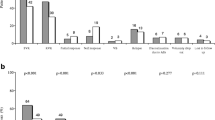Abstract
Background
Current guidelines recommend that interferon-based treatment of hepatitis C (HCV) genotype 2 or 3 in those with HIV coinfection should be for 48 weeks, especially if HCV PCR remains positive after 4 weeks of treatment.
Aim
To examine a single-center experience using response-guided therapy (RGT) using pegylated interferon (PegIFN) and weight-based ribavirin (RBV) for treating HCV genotype 2 or 3 in those with HIV coinfection.
Methods
Electronic medical records were used to identify patients with HCV genotype 2 or 3 HIV coinfection seen at the Toronto General Hospital Immunodeficiency Clinic from February 2003 to December 2012. HCV PCR was tested after every 4 weeks of treatment until it was negative (<50 IU/mL). RGT protocol was as follows: Those with HCV PCR first negative after 4 weeks (VR4) were treated 24 weeks; first negative after 8 weeks (VR8) treated 36 weeks and VR12 treated 48 weeks.
Result
Database search identified 35 individuals with HCV genotype 2 or 3. Twelve were excluded. Total 23 patients completed the treatment and were included for data analysis. Eleven of 23 (48 %) achieved VR4 and eleven of 23 (48 %) achieved VR8. Only one individual had detectable viremia to week 12 and required 48 weeks of treatment. The majority (96 %) were successfully treated with <48 weeks of PegIFN–RBV therapy. One hundred percent achieved SVR with a response-guided HCV therapy.
Conclusion
The use of response-guided therapy allows therapy to be shortened in the majority of individuals. HCV PCR testing should be performed every 4 weeks during the first 12 weeks of therapy until HCV PCR is negative.
Similar content being viewed by others
References
Naggie S, Sulkowski MS. Management of patients coinfected with HCV and HIV: a close look at the role for the role for direct-acting antivirals. Gastroenterology. 2012;142:1324–1334.
Klein MB, Saeed S, Yang H, et al. The Canadian HIV-hepatitis C Co-infections cohort study (CCC; CTN 222 study). Int J Epidemiol. 2010;39:1162–1169.
Iorio A, Marchesini E, Awad T, Gluud LL. Antiviral treatment for chronic hepatitis C in patients with human immunodeficiency virus. Cochrane Database Syst Rev. 2010; Issue 1. Art. No.:CD004888. doi:10.1002/14651858.CD004888.pub2.
Dieterich D, Soriano V, Sherman K, Girard PM, Rockstroh J, Adiwijaya B, et al. Teleprevir in combination with pegylated interferon-alpha-2a plus RBV in HCV/HIV co-infected patients: a 24-week treatment interim analysis [Abstract]; CROI; 2012; A46.
Sulkowski M, Pol S, Cooper C, Fainboim H, Slim J, Rivero A, et al. Boceprevir plus pegylated interferon plus ribavirin for the treatment of HCV/HIV co-infected patients: End of Treatment (Week-48) Interim Results [Abstract]. CROI 2012; A47.
Cohen J. Pharmaceuticals. Advocates protest the cost of a hepatitis C cure. Science. 2013;342:1302–1303.
Brook G, Main J, Nelson M, et al. British HIV association guidelines for the management of coinfection with HIV-1 and hepatitis B or C virus 2010. HIV Med. 2010;11:1–30.
Rockstroh JK, Bhagani S, Benhamou Y, et al. European AIDS Clinical Society (EACS) guidelines for the clinical management and treatment of chronic hepatitis B and C coinfection in HIV-infected adults. HIV Med. 2008;9:82–88.
Ghany M, Strader B, Thomas D, Seeff L. Diagnosis, management, and treatment of hepatitis C: an update. Hepatology. 2009;49:1335–1374.
Dalgard O, Bjoro K, Hellum KB, et al. Treatment with pegylated interferon and ribavirin in HCV infection with genotype 2 or 3 for 14 weeks: a pilot study. Hepatology. 2004;40:1260–1265.
Mira JA, Valera-Bestard B, Arizcorreta-Yarza A, et al. Rapid virological response at week 4 predicts response to peglyated interferon plus ribavirin among HIV/HCV-coinfected patients. Antivir Ther. 2007;12:523–529.
Martin-Carbonero L, Nunez M, Marino A, et al. Undetectable hepatitis C virus RNA at week 4 as predictor of sustained virological response in HIV patients with chronic hepatitis C. AIDS. 2008;22:15–21.
Rivero-Juarez A, Lopez-Cortes LF, Camacho A, et al. A 24-week treatment strategy with pegylated interferon/ribavirin in HIV/hepatitis C virus genotype 3-coinfected patients who achieved a rapid virologic response results in a high sustained virologic response rate. Clin Infect Dis. 2014;58:130–133.
James PD, Wong DK. Optimizing hepatitis C therapy in HIV hepatitis C virus (HCV) coinfected patients: analysis of HCV viral kinetics on treatment. Can J Infect Dis Med Microbiol. 2012;23:31–35.
Mandorfer M, Neukam K, Reiberger T, et al. The impact of interleukin 28B rs12979860 single nucleotide polymorphism and liver fibrosis stage on response-guided therapy in HIV/HCV-coinfected patients. AIDS. 2013;27:2707–2714.
Sarrazin C, Susser S, Doehring A, et al. Importance of IL28B gene polymorphisms is hepatitis C virus genotype 2 and 3 infected patients. J Hepatol. 2011;54:415–421.
Rangnekar AS, Fontana RJ. IL-28B polymorphisms and the response to antiviral therapy in HCV genotype 2 and 3 varies by ethnicity: a meta-analysis. J Viral Hepat. 2013;20:377–384.
Acknowledgments
The authors acknowledge the critical role played by the HIV clinic nurses at the Toronto General Hospital Immunodeficiency Unit involved with HCV treatment: Pauline Murphy, Christine Walach, and Joanne Daly.
Conflict of interest
None.
Author information
Authors and Affiliations
Corresponding author
Rights and permissions
About this article
Cite this article
Win, L.L., James, P. & Wong, D.K. Response-Guided Therapy for Hepatitis C Genotype 2 and 3 in Those with HIV Coinfection. Dig Dis Sci 59, 1946–1949 (2014). https://doi.org/10.1007/s10620-014-3211-6
Received:
Accepted:
Published:
Issue Date:
DOI: https://doi.org/10.1007/s10620-014-3211-6




